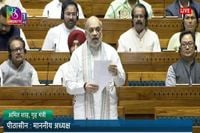Indian lawmakers are currently engaged in a heated debate over the Waqf (Amendment) Bill, 2024, which seeks to overhaul the management of properties valued at billions of dollars that have been donated by Indian Muslims over centuries. The bill, presented on April 2, 2025, by Union Minority Affairs Minister Kiren Rijiju, has sparked significant controversy, with the ruling Bharatiya Janata Party (BJP) supporting it while opposition parties and Muslim organizations vehemently oppose it.
The government argues that the Waqf (Amendment) Bill will introduce much-needed transparency into the management of waqf properties, which include mosques, madrassas, and shelter homes. However, critics claim that the bill undermines the constitutional rights of India’s largest religious minority. Mallikarjun Kharge, leader of the opposition in the Rajya Sabha, stated that the opposition is united in its resolve to defeat what they view as a "divisive agenda" by the Modi government.
The bill was initially tabled in parliament in August 2024, but due to widespread opposition, it was sent to a Joint Parliamentary Committee (JPC) for further review. The version of the bill presented on Wednesday incorporates 25 amendments suggested by the JPC, which included members from opposing parties. However, many opposition members allege that the JPC only accepted changes proposed by the BJP and its allies, while dismissing their amendments.
In the Lok Sabha, the BJP requires at least 272 votes to pass the bill, and they currently hold 240 seats. With the support of their allies, including the JD(U), TDP, LJP, RLD, and Shiv Sena, they are confident of securing enough votes to push the bill through, despite the anticipated opposition from parties like Congress.
Critics of the bill argue that it grants the government excessive power to regulate waqf properties and determines what qualifies as "waqf." The proposed legislation also includes provisions for the inclusion of two non-Muslim members on the waqf boards, which has raised concerns among some groups who feel that this undermines the autonomy of these religious institutions. Asaduddin Owaisi, leader of the AIMIM, condemned the bill as unconstitutional, stating, "This Bill is a grave violation of Article 14, Articles 25, 26 and 29. This is not a Waqf Bill; rather it’s a Waqf Barbaad Bill."
On the other hand, the government defends the bill as a necessary measure to improve the functioning of waqf boards. Rijiju emphasized that the JPC’s consultation process was unprecedented, with over 97.27 lakh petitions and memorandums received, and 284 delegations providing input. He asserted that the government would not interfere in religious institutions and that the bill is focused solely on property management.
Furthermore, the bill stipulates that only practicing Muslims who have been so for at least five years can dedicate properties to waqf, thereby restoring rules that were in place before 2013. It also mandates that women receive their inheritance before any waqf declaration, with special provisions for widows, divorced women, and orphans.
Despite the government's assurances, many feel that the bill could lead to the seizure and destruction of waqf properties. The opposition is particularly concerned about the potential for government overreach into religious affairs. Mohibbulah of the Samajwadi Party expressed that the bill violates fundamental rights and undermines the autonomy of waqf boards.
In a moment of heightened rhetoric, Union Home Minister Amit Shah addressed the Lok Sabha, stating, "No non-Muslim will come into the Waqf. There is no such provision to include any non-Muslim among those who manage the religious institutions." He accused the opposition of spreading misconceptions to instill fear among minorities for electoral gain.
The bill, if passed, will then move to the Rajya Sabha for further discussion and approval. Should it clear both houses, it will require the assent of President Droupadi Murmu before becoming law. Given the current political dynamics, the BJP-led coalition appears poised to secure the necessary votes, barring any unforeseen developments.
As the debate unfolds, it remains to be seen how the final version of the Waqf (Amendment) Bill will impact the management of waqf properties across India and the rights of the Muslim community. With strong sentiments on both sides, the outcome could have lasting implications for the relationship between the government and minority groups in the country.







